
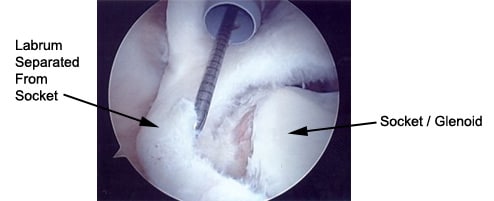
SLAP lesions are a unique type of labral tear in the shoulder. SLAP lesions occur in overhead athletes due to chronic repetitive stress. But many SLAP lesions are simply due to aging. How should your SLAP lesion be treated? MRI machines have become more powerful and radiologists have become better at interpreting the findings. Perhaps that is why shoulder surgeons have noticed a significant increase in the number of SLAP lesions being diagnosed across all age groups. It is important to bear in the mind the research of DePalma performed over 70 years ago. During his autopsy studies, he found that more than 75% of people over 60 had labral tears in the shoulder. Simply stated that means that the majority of these tears are not bothersome, do not hurt you and thus do not, in and of themselves require surgery. Again, as hard as it is to hear, sometimes our parts simply wear out. So it is important that we listen to you describe your symptoms, correlate that with a proper physical exam and then determine if a SLAP lesion is the cause of your pain.
What is a SLAP lesion or SLAP tear?
The two terms are synonymous. They mean the same thing. As the picture above shows, a SLAP lesion involves the tear of the glenoid labrum from the top of the socket of the shoulder.
The superior labrum serves as the attachment for our biceps tendon inside the shoulder. The labrum plays a role in the stability of the shoulder. It helps keep the shoulder well seated within the socket during aggressive overhead activities such as pitching, swimming and playing volleyball. The superior labrum does not come into play from a functional perspective during our normal daily activities of dressing, feeding, cleaning, weeding, gardening, running, cycling, etc.
Why do SLAP lesions hurt?
SLAP lesions can lead to a unique form of instability (where the shoulder is “loose”), and as previously mentioned, primarily occurs in overhead athletes. When the shoulder is loose because of a SLAP tear, and the player puts their arm up in the throwing position they may feel pain in the back of the shoulder. We call this “internal impingement”. This occurs because the SLAP tear has led to a very subtle loosening (not enough for the shoulder to dislocate) which will hurt when the superior labrum (where the tear is) is stressed.
Does a SLAP Lesion require surgery?
A troubling study was just released …
A study in May 2012 issue of The American Journal of Sports Medicine reflects this trend (towards operating on too many SLAP tear). Alan L. Zhang et al looked at insurance data collected for over 11 million patients from 2004 to 2009. They found a remarkable 105% increase in SLAP repairs performed across the United States between 2004 and 2009.
The 20-29 year and 40-49 year age groups had the highest incidence of SLAP repairs. Males comprised approximately 75% of those surgical patients. Interestingly, SLAP repairs were performed more often in the West and the South compared to the Midwest and Northeast.
The majority of SLAP lesions or tears encountered in a typical orthopedists office do not need to be repaired and are usually not the source of pain. Even if the surgeon believes that the tear might be the source of pain, the results of repairing SLAP lesions has been relatively poor in patients over 35-40, so many researchers suggest that the tear not be fixed and that a biceps tenodesis be performed ( anchoring the biceps on the humerus and taking the stress off of the superior labrum.
SLAP lesions found in young pitchers, volleyball players, tennis players and swimmers can be fixed if the tear is leading to significant pain and the inability of the athlete to perform at their usual performance level. They do, however, have the option of changing positions, etc and not having surgery. But bear in mind, just because a SLAP lesion is fixed, does not mean you will return to pitching.
The results of SLAP lesion repairs and return to sports is also mixed. Some reports show that athletes can return to their prior performance levels, yet some recent literature shows that that might not be the case. The jury is still out on this.
Bottom line:
SLAP lesions are very common. Just because you have one, does not mean you need surgery. If you are an overhead athlete and have internal impingement due to a SLAP tear you may choose to have surgery – but you may not be able to return to your prior level of functional performance. Tough decision.


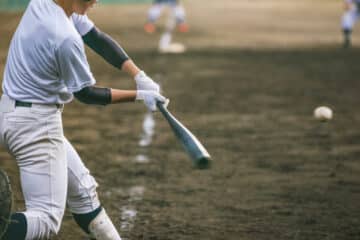
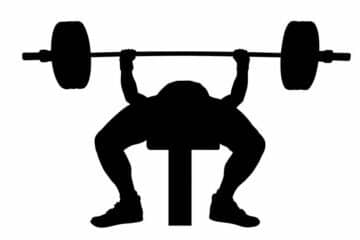
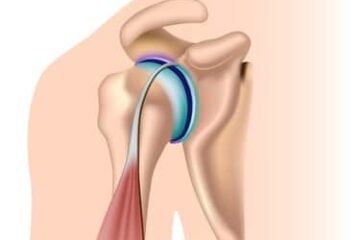
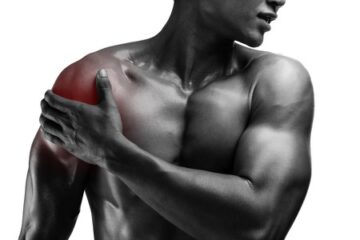








Dear Dr. Luks,
I am a 53 year old man. My original injury was about 18 years ago when playing basketball and landed on my outstretched shoulder. Dr. said if I was a professional athlete, he’d do surgery, but otherwise, it should function and heal acceptably. For many years I haven’t been able to throw a ball overhand without feeling like my shoulder was slipping out. For the last couple of years I had to make sure my wife was on my left side to put my arm around her when at church or a movie (whenever raising my arm, it would sometimes “slip” when I tried to bring it back down. About a year ago, I had to stop lifting weights – not heavy, just trying to get a little exercise. Recently, I had to stop sleeping on that side as it causes pain.
I went to an orthopedist which recommended physical therapy. I tried for weeks with no improvement, then tried a cortisone shot in the shoulder. Within a couple weeks it was feeling very good, but while reaching up to get a bowl from the shelf, nothing heavy, felt a sharp pain. Since then therapy didn’t help, and many simple moves feel like the shoulder is slipping out causing pain – maybe a 6-7. It subsides fairly quickly, but happens often, greatly reducing quality of life. I almost constantly feel some discomfort – not necessarily pain.
MRI results showed mild thickening and irregularity of the supraspinatus tendon (otherwise intact). Minimal fraying of the ifraspinatus insertion (otherwise intact), mild thickening of the subscapularis tendon – no evidence of rotator cuff tear.
It says the glenoid labrum is intact with no evidence of labral tear, but an extensive SLAP lesion with the tear from 9-2. Also a small paralabral cyst anteriorly, 2mm.
It also said the signal in the marrow spaces is unremarkable, no evidence of fracture or dislocation, and mild hypertrophy and degenration of the acromioclavicular joint.
The doctor gave options of a shot guided by a scope or the surgery. He says it is not disclocating, but the tendon (or ligament? I forget) is moving around, causing that feeling of instability I have. Since that movement is when I feel the pain, my thinking is that it is time for the surgery, and that another shot would at best be a temporary fix. Does that make sense to you? I scheduled surgery for next month, but will be getting a second opinion in a week.
Thank you so much in advance!
Fixing SLAP lesions in a 50 something is not advisable. Cleaning out a torn piece might help ???? repeat might, if it is loose and floating in the joint. The irregularity of the rotator cuff is the most common cause of pain in our age group — that’s early tendinosis. I can’t say whether or not surgery is the right answer for you without examining you. Good Luck !!!
Hi Dr. Luks,
I am a 34 year old female who is active in sports, and I am also a firefighter and rescue technician. About 3 months ago I injured my shoulder when I landed on it wrong doing a roll in Hapkido. My pain was evident immediately but then seemed to subside enough for me to complete practice. However, immediately after practice I had a horrible aching pain along the outside of my shoulder. This pain didn’t subside and I saw an Orthopaedic surgeon 3 weeks out from injury. I had lost quite a bit of range of motion and he said I likely had rotator cuff tendonitis and possibly a SLAP tear. I did 4 weeks of PT and was prescribed Naproxen. The Naproxen did help a bit with the pain and PT helped my range of motion, but I was still having sharp pains at times and aching pain from time to time. I went for a follow up at which time he sent me to more PT and for an MRI without contrast. 4 weeks later I was back in the office, still with pain but again improved range of motion. He said the MRI showed tendonitis but no obvious rotator cuff tear but that he could not rule out SLAP tear from what he saw. He gave me a cortisone injection which didn’t do anything (in fact, it made it worse and took me a week to get back to my new normal level of pain) and again another round of 6 weeks of PT. During PT, I can do pretty much everything but it is painful, and it really hurts when he pushes on and manipulates my joint. I am due to go back to the surgeon again in 3 weeks and am frustrated. Based on my reading it seems like a lot of shoulder issues manifest with the same symptoms. I have also seen a lot of information on the use of MR arthograms instead of normal MRIs for diagnosing SLAP lesions. I’m lost as to what to do. Whenever I try to resume normal activities I end up in significant pain. I don’t want to have surgery if it isn’t necessary. I want to be able to definitively say what the issue is without having to do anything exploratory. Should I ask to have a MR arthrogram done? How else can I know whether my pain is just tendonitis or is a SLAP tear?
A good exam should be able to tell you :-) It is not a lost art :-)
Perhaps a second opinion? PErhaps an ultrasound guided injection to know if the correct space was injected?
Good Luck